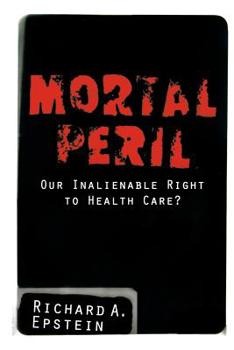Mortal Peril: Our Inalienable Right to Health Care?
Select Format
Select Condition 
Book Overview
In this seminal work, distinguished legal scholar Richard Epstein daringly refutes the assumption that health care is a "right" that should be available to all Americans. Such thinking, he argues, has fundamentally distorted our national debate on health care by focusing the controversy on the unrealistic goal of government-provided universal access, instead of what can be reasonably provided to the largest number of people given the nation's limited resources. With bracing clarity, Epstein examines the entire range of health-care issues, from euthanasia and organ donation to the contentious questions surrounding access. Basing his argument in our common law traditions that limit the collective responsibility for an individual's welfare, he provides a political/economic analysis which suggests that unregulated provision of health care will, in the long run, guarantee greater access to quality medical care for more people. Any system, too, must be weighed on principles of market efficiency. But such analysis, in his view, must take into account a society-wide as well as an individual perspective. On this basis, for example, he concludes that older citizens are currently getting too much care at the expense of younger Americans. The author's authoritative analysis leads to strong conclusions. HMOs and managed care, he argues, are the best way we know to distribute health care, despite some damage to the quality of the physician-patient relationship and the risk of inadequate care. In a similar vein, he maintains that voluntary private markets in human organs would be much more effective in making organs available for transplant operations than the current system of state control. In examining these complex issues, Epstein returns again and again to one simple theme: by what right does the state prevent individuals from doing what they want with their own bodies, their own lives, and their own fortunes? Like all of Richard Epstein's works, Mortal Peril is sure to create controversy. It will be essential reading as health-care reform once again moves to the center of American political debate.
Format:Paperback
Language:English
ISBN:0738201898
ISBN13:9780738201894
Release Date:June 2000
Publisher:Basic Books
Length:528 Pages
Weight:1.74 lbs.
Dimensions:1.3" x 6.0" x 9.0"
Related Subjects
Administration & Medicine Economics Administration & Policy Business & Finance Business & Investing Health Health Care Delivery Health Policy Health, Fitness & Dieting Health, Fitness & Dieting Medical Medical Books Parenting & Relationships Philosophy Political Science Politics & Government Politics & Social Sciences Social Sciences TextbooksCustomer Reviews
1 rating
Inspires agreement and argument
Published by Thriftbooks.com User , 21 years ago
A fiercely libertarian roommate of mine gave me this book to read, and I was pleasantly surprised to discover that it was about more than health care. The beginning is actually a good primer on common law, and an effective encapsulation of the philosophical foundations of libertarian thought. Epstein effectively cuts through the platitudes that have been shaping decades of largely ineffective government policy-the sanctity of every single human life, for example-and explains how accepting these commonplaces can lead to results that are worse for everyone.The section dealing with common law mostly discusses the distinction between positive rights and negative rights. Positive rights are those that grant a people the right TO something: liberty, for example, or the right to a decent standard of living. Negative rights give the people the right NOT to have something happen to them: infringement on their person or property, or unfair treatment by another party. Far from being a small semantic distinction (I'm sure all of us can think of how most laws could be stated in either positive or negative form) Epstein shows how positive rights are much harder to enforce, and generally lead to a variety of perverse consequences when we try. The rest of the book-dealing with the Clinton health care proposal, for example-has dated, but is worth reading for the application of these ideas. Epstein writes an elegant but dry sentence, with occasional jargon, and except for the times when he gets passionate, the book moves along at a stately plod: I had to reread several sections to make sure I understood them. But he is clear, and avoids the most intolerable feature of many libertarian thinkers: intellectual smugness. He understands that government welfare policies are generally motivated by noble impulses, and that the way to convince people isn't to jump around doing the I'm-so-smart dance, but to illustrate the difficulties of turning a moral imperative into a government edict.The part of the book I had the most trouble with was that dealing with charity. Epstein points out that private charity was doing an excellent job before the government stepped in and took the responsibility off the shoulders of the individual, who now felt (often) that he had done his part just by paying his taxes. In other sections, however, Epstein maintains that having government welfare discourages people from taking care of their own health, because they now realize that they have a safety net.Now, I don't understand how a government safety net would discourage people from doing this any more than a private safety net. Epstein could argue that a safety net based on private charity would be more selective, but in my experience this isn't true: a church asks fewer questions than the government. The biggest problem with Epstein's argument is that, if taken to its logical conclusion, it's opposed to the idea of any effective charity at all: anything that tells people that the






